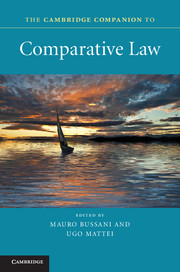Book contents
- Frontmatter
- Contents
- Contributors
- Abbreviations
- Preface
- Part I Knowing comparative law
- Part II Comparative law fields
- 6 Comparative studies in private law
- 7 Comparative administrative law
- 8 Comparative constitutional law
- 9 Comparative criminal justice
- 10 Comparative civil justice
- 11 Comparative law and international organizations
- Part III Comparative law in the flux of civilizations
- Index
- References
11 - Comparative law and international organizations
Published online by Cambridge University Press: 05 May 2013
- Frontmatter
- Contents
- Contributors
- Abbreviations
- Preface
- Part I Knowing comparative law
- Part II Comparative law fields
- 6 Comparative studies in private law
- 7 Comparative administrative law
- 8 Comparative constitutional law
- 9 Comparative criminal justice
- 10 Comparative civil justice
- 11 Comparative law and international organizations
- Part III Comparative law in the flux of civilizations
- Index
- References
Summary
The term ‘international organization’ covers a wide field, from the International Red Cross to the Food and Agricultural Organization, the World Trade Organization and the European Union. The place of comparative law in the establishment and functioning of these institutions will thus vary greatly according to the organization. It is nevertheless possible to identify certain recurring aspects relating to the establishment, functioning, and control of international organizations in which comparative law has an actual or potential role to play. This is unsurprising because law itself is present in all these dimensions of international organization activity.
First, international organizations themselves represent the result of decisions of both a legal and a political character. Second, international organizations, once created, become legally anchored within one legal system or another, the characteristics of which must be understood by all who may come into contact with it. Third, international organizations commonly engage in prescriptive or normative activity by which secondary law (i.e. law generated by the organization as distinct from the law that created the organization itself) comes into being. Fourth, some of the most important international organizations from a legal point of view have as a mission the developing of draft treaties that are intended to be signed and ratified by a sufficient number of states to come into force or the production of model legislation that national legislatures may enact into law. Fifth, whether an international organization generates legal norms or engages in a quite different set of activities, it is more likely than not operating according to a more or less formal set of procedures that may either have been prescribed for the organization on its founding or established by the organization itself as and when it began conducting its activities. In either case, for the organization itself, those procedures very much constitute law. Sixth, more and more international organizations perform adjudicatory functions, which require that they both apply legal norms and observe legal procedures. Seventh, and finally, international organizations may be subject to external legal norms that further constrain their freedom of action.
- Type
- Chapter
- Information
- The Cambridge Companion to Comparative Law , pp. 241 - 254Publisher: Cambridge University PressPrint publication year: 2012
References
- 1
- Cited by

